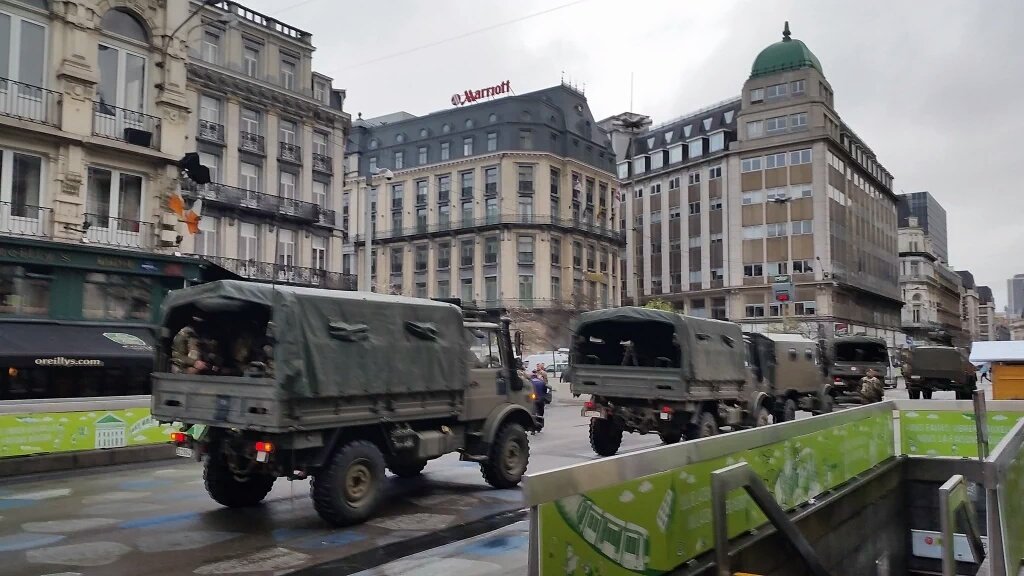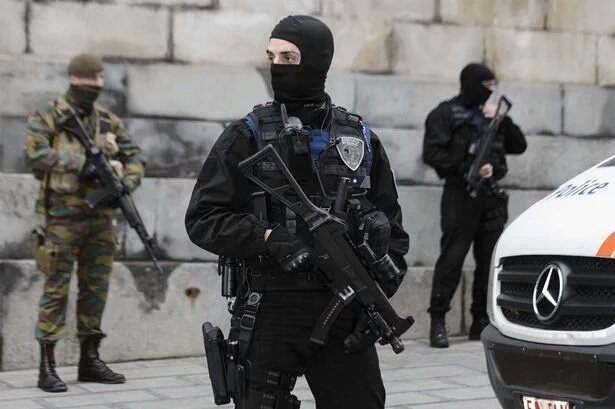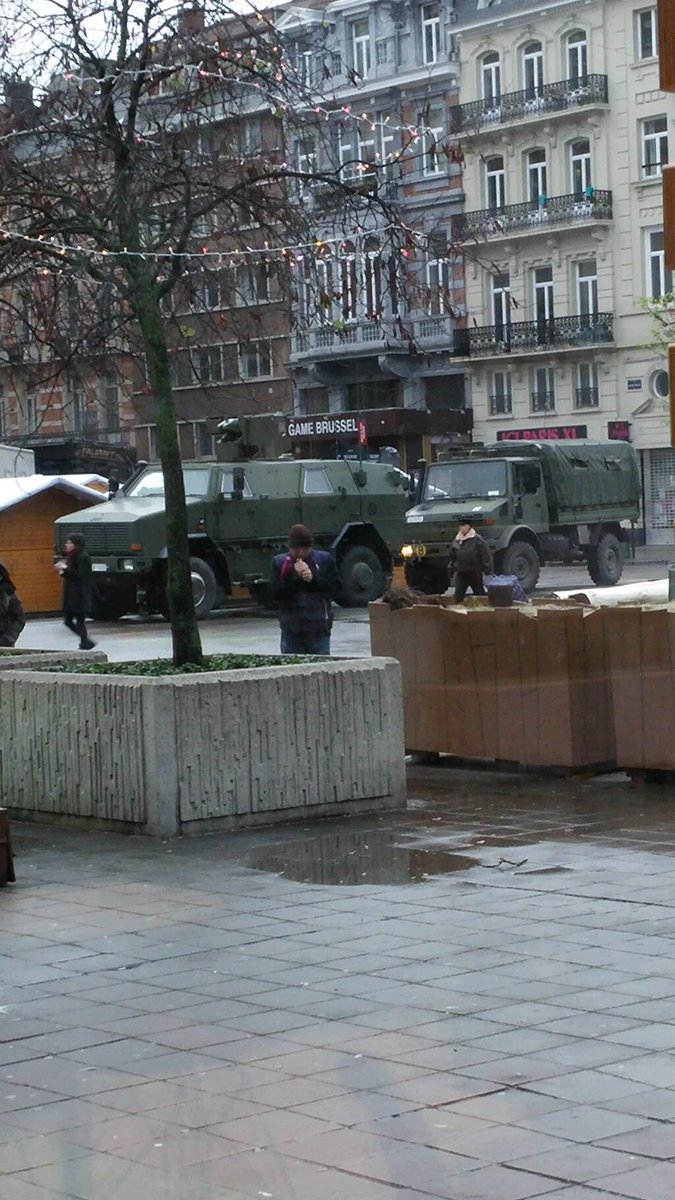The New Normal in Europe
"It Looks Like A Warzone" - Army, APCs, Roadblocks Deployed In Brussels After Explosives, Chemical Weapons Found
21
November, 2015
In
the aftermath of last
night's warning of
an "imminent" terror threat in Brussels when OCAM Crisis
Center and the government raised the country's terror alert to the
highest level, today the escalation continues and the Belgian capital
looks like not only a ghost town but something out of a Call of Duty
warzone after authorities deployed special forces, and APCs, shut the
metro, locked down shopping centers, closed sporting events, and
warned the public to avoid crowds, train stations, airports and
commercial districts because of a "serious and imminent"
threat of an attack.
As Reuters
reports, a week
after the Paris attacks carried out by Islamic State militants, of
whom one suspect from Brussels is at large and said by authorities to
be highly dangerous, Brussels was placed on the top level "four"
in the government's threat scale after a meeting of top ministers,
police and security services.
"The
advice for the population is to avoid places where a lot of people
come together like shopping centers, concerts, events or public
transport stations wherever possible,"
a spokesman for the government's crisis center said.
As
AFP reported earlier, the spike in the terror threat is due to a risk
of attacks by "weapons and explosives"
#BREAKING Belgium terror alert linked to a risk of attacks by 'weapons and explosives': PM
The
local security forces are taking no chances, and as can be seen on
the photos below, APC have been deployed as the city barricades
itself with the use of roadblocks at strategic locations.
Metro closed, all football games cancelled and city center looks like military base. #Brussels 2015 #Bruxelles
Belgian
Prime Minister Charles Michel declined to give the reason why the
authorities raised the alert level but told a news conference the
government would review the security situation on Sunday afternoon
and that the decision to raise the threat level was taken “based on
quite precise information about the risk of an attack like the one
that happened in Paris where several individuals with arms and
explosives launch actions, perhaps even in several places at the same
time." The metro system would remain closed until then, in line
with the recommendation of the crisis center, he said.
The
reason for the dramatic escalation is that chemicals and explosives
were among the items found in the during a police
raid on Vandepeerboom Street area in the immigrant neighborhood of
Molenbeek,
a rundown area where Paris attacker Abdelhamid Abaaoud was suspected
of operating a terrorist cell.
L'Echo
has more:
A search was conducted on Friday at the home of a suspect placed under arrest, federal prosecutors said on Saturday. Some weapons have been discovered, but no explosives or explosive belt.
The suspect was arrested Thursday in the series of searches carried out in Brussels. The person concerned is suspected of involvement in terrorist attacks and participation in activities of a terrorist group.
The
find came as Belgium’s capital entered a security lockdown. The
government has warned that there could be a repeat of Paris-style
attacks in the country’s capital, prompting the closure of subways
in Brussels and the deployment of heavily armed police and soldiers.
Fears
that terrorists may use chemical or biological weapons quickly spread
to Paris where according
to the Guardian,
security has been stepped up at key water supply sites in Paris,
after the French prime minister warned the country could not rule out
attacks from “chemical or biological weapons”.
The
heightened security comes as reports claim that biohazard suits have
been stolen from a Paris hospital, the Telegraph reports. Eau de
Paris, the municipal water company, yesterday told Le Parisien that
access to its sites has been limited to only the necessary service
personnel, and that they have been accredited by the defence
ministry.
Furthermore,
we learned today that one more suspect from last Friday's terror
attack has been arrested in Brussels which has quickly emerged as the
nerve center of last week's Paris attacks.
According to Belgian media @RTBFinfo a key suspect in the #ParisAttacks was arrested in the Brussels region last night
As
Reuters further adds, the crisis center website said it was calling
on local authorities to cancel large events, urge people to avoid
crowds, postpone soccer matches, close the Brussels metro for the
weekend and stepping up the military and police presence. Suspected
militant Salah Abdeslam, 26, returned home to Brussels from Paris
after the attacks, when his elder brother Brahim blew himself up at a
cafe.
Fears of the risk he still poses prompted the cancellation last week of an international friendly soccer match in Brussels against Spain. The crisis center said weekend games in the top two professional divisions should now be postponed.
The alert level for the whole country was raised following the Paris attacks to level three out of four, implying a "possible or probable" threat. Previously, only certain sites, such as the U.S. embassy, were at level three.
Belgium, and its capital in particular, have been at the center of investigations into the Paris attacks - which included suicide bombers targeting a France-Germany soccer match - after the links to Brussels emerged. Three people detained in Brussels are facing terrorism charges.
As
a reminder, French authorities have said the attacks were planned in
Brussels by a local man, Abdelhamid Abaaoud, 28, who fought for
Islamic State in Syria and was killed in the siege of an apartment in
the Paris suburb of St. Denis on Wednesday.
Salah
Abdeslam, who was from the same Brussels neighborhood of Molenbeek
and is said by officials to have known Abaaoud in prison, was pulled
over three times by French police but not arrested as he was driven
back to Brussels early last Saturday by two of the men now in
custody.
As
well as Abdeslam's brother, a second man from Molenbeek, Bilal Hadfi,
was also among the Paris suicide bombers.
Belgian
Interior Minister Jan Jambon told reporters he wanted a register of
everyone living in Molenbeek because it was not clear at present who
was there, with authorities conducting door-to-door checks of every
house. "The local administration should knock on every door and
ask who really lives there,"
Jambon said. Curiously when Donald
Trump suggests doing something comparable in the US, immediate
comparisons with Hitler emerge.
Meanwhile,
as the photos below show, soldiers are already on guard in all key
parts of Brussels, including at the institutions of the European
Union headquartered in the city. Brussels is also home to the
headquarters of NATO.
Finally,
Belgium's interior ministry has released the following list of
recommendations what the local population should do while the terror
threat is at its highest level.





 Agence France-Presse
Agence France-Presse Zaprudsky
Zaprudsky


 Henk de Boer
Henk de Boer 









 oh
oh  Wilhelm
Wilhelm  Just A KatyCat™ ♡
Just A KatyCat™ ♡ 
 Golfin Bohab
Golfin Bohab  Mark Konieczny
Mark Konieczny  Jáck
Jáck  joseph langton
joseph langton  Uncle Fedor
Uncle Fedor  Zehra osmic
Zehra osmic  stefany
stefany  Emmely Gelaude
Emmely Gelaude  Viacheslav Makarov
Viacheslav Makarov  Leanne J
Leanne J  Vesa Hietanen
Vesa Hietanen  Dimitar Georgievski
Dimitar Georgievski  chanel n° 2
chanel n° 2  M
M  nobbsy#lestweforget
nobbsy#lestweforget  Callum
Callum  Viking Wage
Viking Wage  Michael Horowitz
Michael Horowitz
No comments:
Post a Comment
Note: only a member of this blog may post a comment.